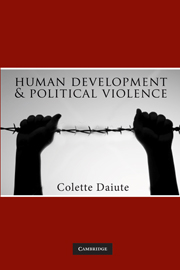Book contents
- Frontmatter
- Contents
- List of Figures
- List of Tables
- Preface
- 1 Beyond the Youth Gap in Understanding Political Violence
- 2 Youth and Society Work Together
- 3 Living History
- 4 Critical Narrating
- 5 Participation Matters
- 6 Sociobiographies
- 7 Human Development in Conflict
- Appendix: Examples of Public Stories across Positions in the DSTY Research Workshop
- References
- Index
3 - Living History
Published online by Cambridge University Press: 05 June 2012
- Frontmatter
- Contents
- List of Figures
- List of Tables
- Preface
- 1 Beyond the Youth Gap in Understanding Political Violence
- 2 Youth and Society Work Together
- 3 Living History
- 4 Critical Narrating
- 5 Participation Matters
- 6 Sociobiographies
- 7 Human Development in Conflict
- Appendix: Examples of Public Stories across Positions in the DSTY Research Workshop
- References
- Index
Summary
The conflict was about the Homeland war. My opinion is that we shouldn't forget the past but that we must look forward to the future. Adults find it difficult to forget certain things from the past. This problem can never be solved because it exists subconsciously.
Feniks, 20, CroatiaI found myself in a very unpleasant situation: I was coming back from school, and two guys on the school bus were fighting. The reason was the unsolved situation from the past. We all got scared, especially when one of them took out a knife.
Aska, 20, BiHThese narratives by 20-year-olds growing up in very different circumstances of a political-violence system are living histories. What these narratives have in common is that they bring the past into present circumstances, in the one case as “the Homeland war” intrudes on the present because “adults find it difficult to forget the past” and in the other as a fight in public erupts because of “the unsolved situation from the past.” The young authors go beyond mere description to explain the effects of such intrusions. According to Feniks, “we shouldn't forget the past,” but focusing on it too much is a problem that “can never be solved.” In the second narrative, Aska connects emotionally: “[W]e all got scared,” as “the unsolved situation from the past” continues to present dangers like fighting and someone brandishing a knife on public transportation.
- Type
- Chapter
- Information
- Human Development and Political Violence , pp. 76 - 112Publisher: Cambridge University PressPrint publication year: 2010



